人教版九年级上册Unit 1 Know yourself 重点短语,句子归纳(共42张PPT)
文档属性
| 名称 | 人教版九年级上册Unit 1 Know yourself 重点短语,句子归纳(共42张PPT) | 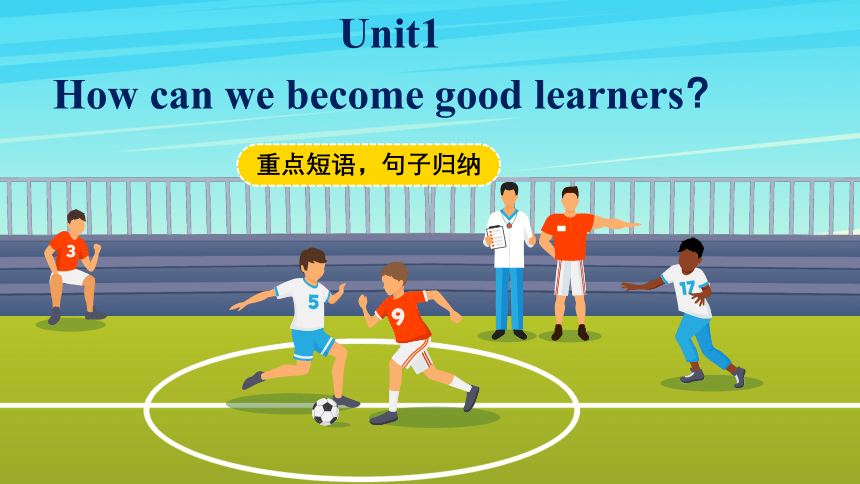 | |
| 格式 | pptx | ||
| 文件大小 | 736.5KB | ||
| 资源类型 | 教案 | ||
| 版本资源 | 牛津译林版 | ||
| 科目 | 英语 | ||
| 更新时间 | 2023-01-25 10:33:41 | ||
图片预览

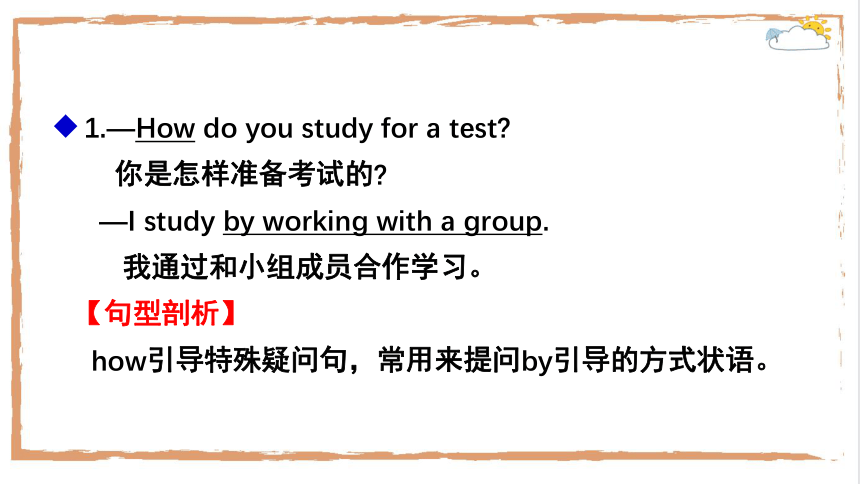
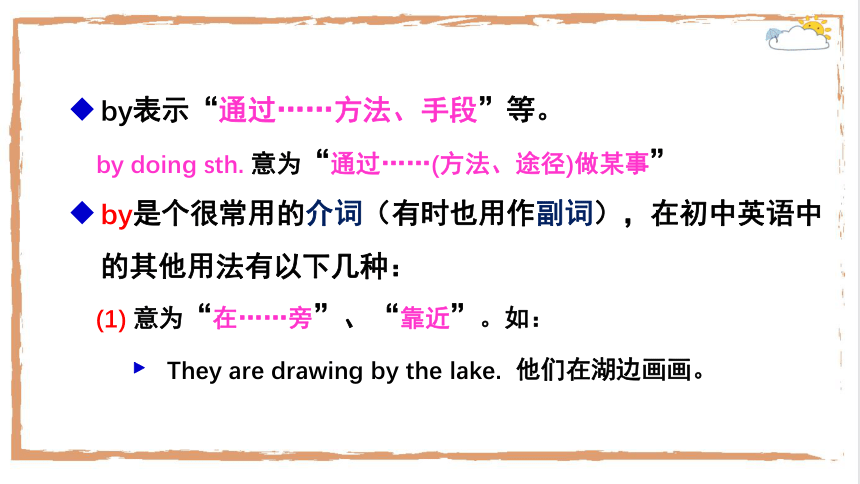
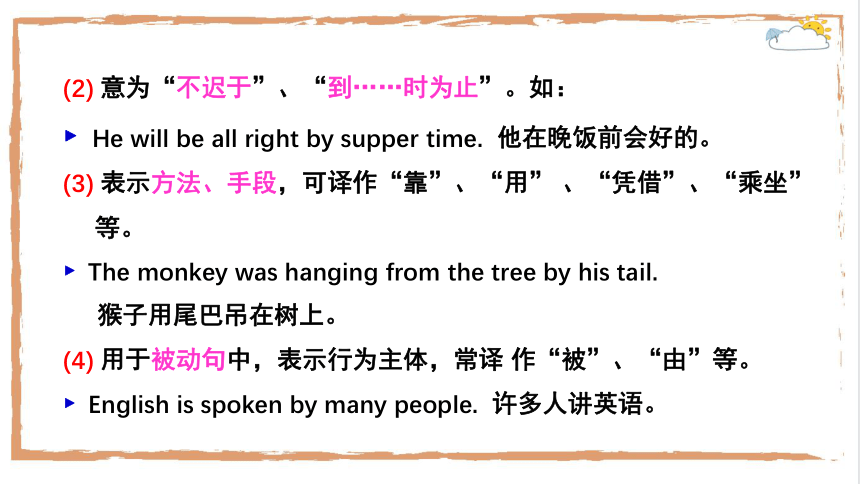
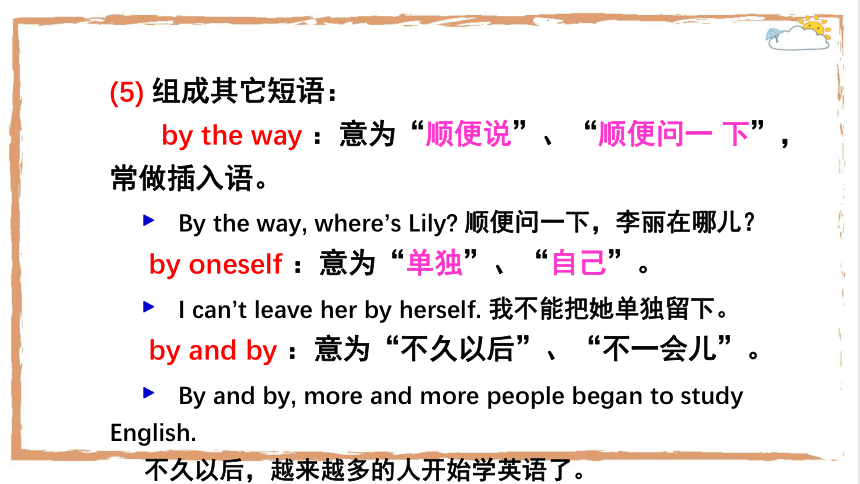
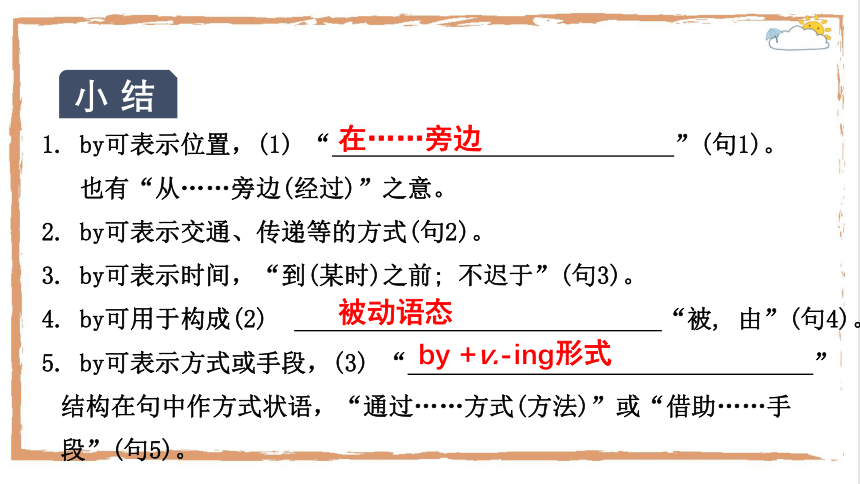
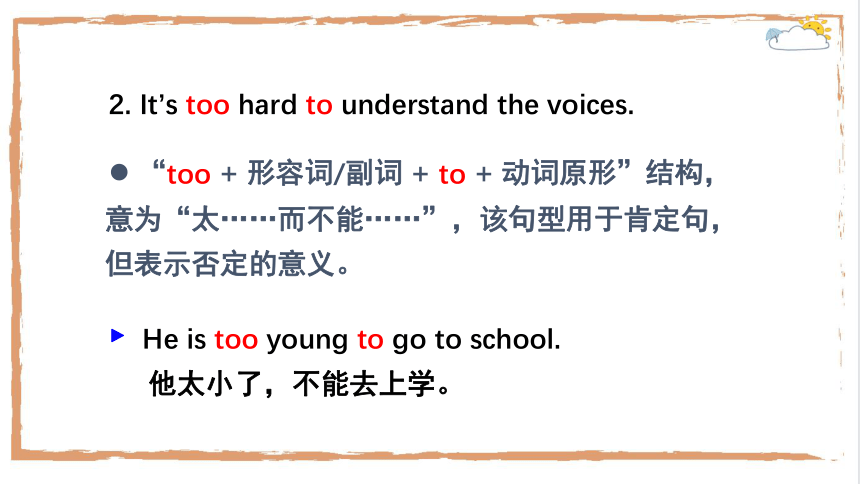
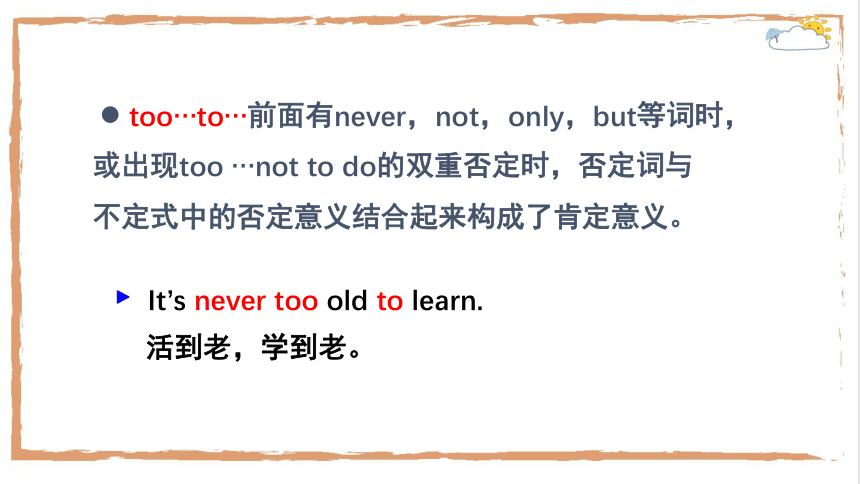
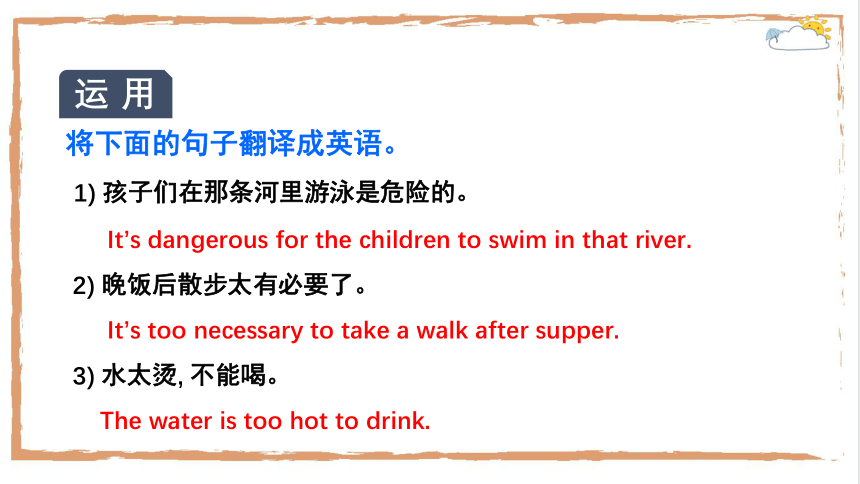
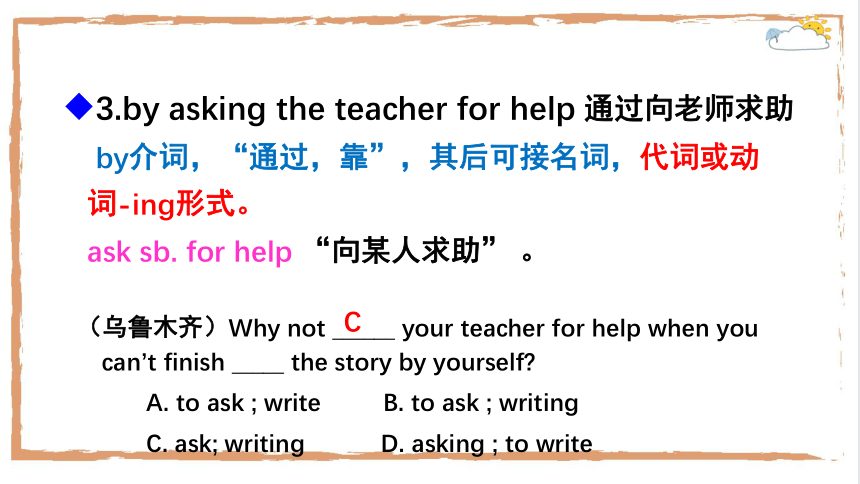
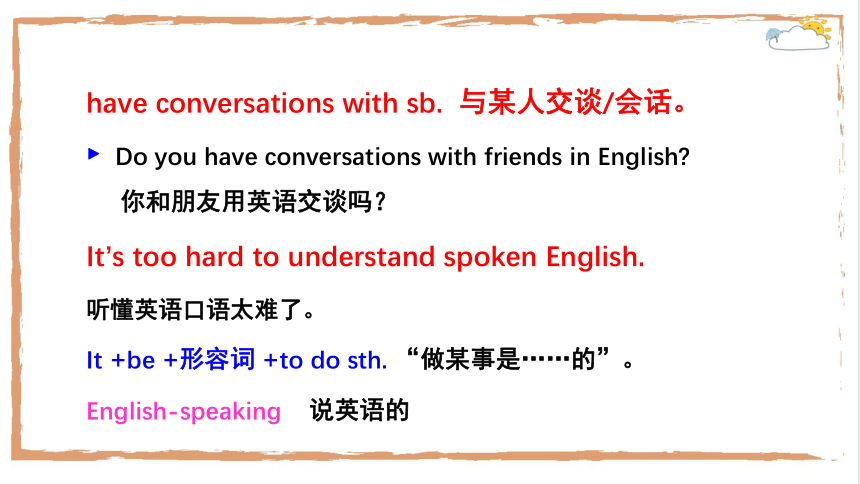
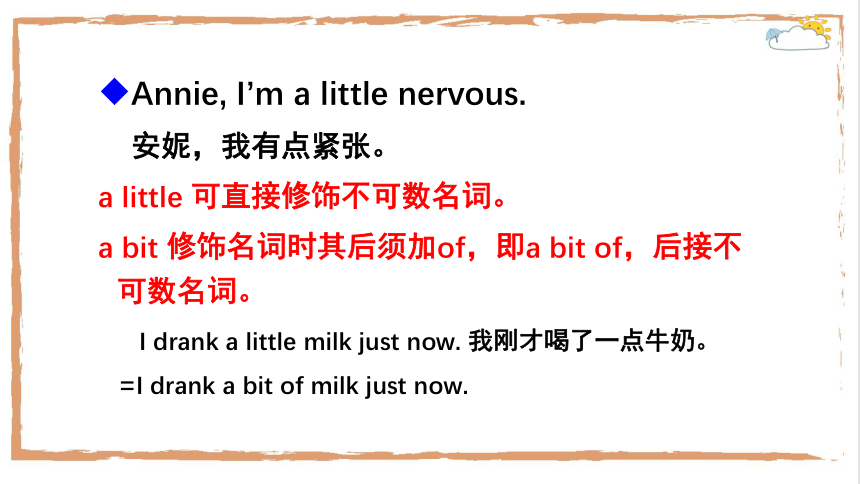
文档简介
(共42张PPT)
Unit1
How can we become good learners?
重点短语,句子归纳
1.—How do you study for a test
你是怎样准备考试的
—I study by working with a group.
我通过和小组成员合作学习。
【句型剖析】
how引导特殊疑问句,常用来提问by引导的方式状语。
by表示“通过……方法、手段”等。
by doing sth. 意为“通过……(方法、途径)做某事”
by是个很常用的介词(有时也用作副词),在初中英语中的其他用法有以下几种:
(1) 意为“在……旁”、“靠近”。如:
They are drawing by the lake. 他们在湖边画画。
(2) 意为“不迟于”、“到……时为止”。如:
He will be all right by supper time. 他在晚饭前会好的。
(3) 表示方法、手段,可译作“靠”、“用” 、“凭借”、“乘坐”等。
The monkey was hanging from the tree by his tail.
猴子用尾巴吊在树上。
(4) 用于被动句中,表示行为主体,常译 作“被”、“由”等。
English is spoken by many people. 许多人讲英语。
(5) 组成其它短语:
by the way :意为“顺便说”、“顺便问一 下”, 常做插入语。
By the way, where’s Lily 顺便问一下,李丽在哪儿?
by oneself :意为“单独”、“自己”。
I can’t leave her by herself. 我不能把她单独留下。
by and by :意为“不久以后”、“不一会儿”。
By and by, more and more people began to study English.
不久以后,越来越多的人开始学英语了。
小 结
1. by可表示位置,(1) “ ”(句1)。
也有“从……旁边(经过)”之意。
2. by可表示交通、传递等的方式(句2)。
3. by可表示时间,“到(某时)之前; 不迟于”(句3)。
4. by可用于构成(2) “被, 由”(句4)。
5. by可表示方式或手段,(3) “ ” 结构在句中作方式状语,“通过……方式(方法)”或“借助……手段”(句5)。
在……旁边
被动语态
by +v.-ing形式
2. It’s too hard to understand the voices.
“too + 形容词/副词 + to + 动词原形”结构,意为“太……而不能……”,该句型用于肯定句,但表示否定的意义。
He is too young to go to school.
他太小了,不能去上学。
too…to…前面有never,not,only,but等词时,或出现too …not to do的双重否定时,否定词与不定式中的否定意义结合起来构成了肯定意义。
It’s never too old to learn.
活到老,学到老。
运 用
将下面的句子翻译成英语。
1) 孩子们在那条河里游泳是危险的。
It’s dangerous for the children to swim in that river.
2) 晚饭后散步太有必要了。
It’s too necessary to take a walk after supper.
3) 水太烫, 不能喝。
The water is too hot to drink.
3.by asking the teacher for help 通过向老师求助
by介词,“通过,靠”,其后可接名词,代词或动
词-ing形式。
ask sb. for help “向某人求助” 。
(乌鲁木齐)Why not ______ your teacher for help when you can’t finish _____ the story by yourself
A. to ask ; write B. to ask ; writing
C. ask; writing D. asking ; to write
C
have conversations with sb. 与某人交谈/会话。
Do you have conversations with friends in English
你和朋友用英语交谈吗?
It’s too hard to understand spoken English.
听懂英语口语太难了。
It +be +形容词 +to do sth. “做某事是……的”。
English-speaking 说英语的
Annie, I’m a little nervous.
安妮,我有点紧张。
a little 可直接修饰不可数名词。
a bit 修饰名词时其后须加of,即a bit of,后接不可数名词。
I drank a little milk just now. 我刚才喝了一点牛奶。
=I drank a bit of milk just now.
4.That doesn’t sound too bad.
那听上去不算太糟糕。
sound用作连系动词,“听起来”,其后常跟形容词。
英语中常用的连系动词:
一是(be),一感(feel),一保持(keep),
起来四个(sound, look, smell, taste),
好像(seem)变了仨( get, turn, become)。
5.The more you read, the faster you’ll be.
你读书越多,你(读书的速度)就会越快。
“the +比较级,the +比较级”意为“越……就越……”。
(重庆中考) The more you smile, the ______ you will feel.
B
happy B. happier
C. happily D. more happily
6.Why did Wei Fan find it difficult to learn English
为什么魏芬发现学英语很难?
“find + it +adj. +to do sth.”“发现做某事……”,it为形式宾语,to do sth为真正的宾语。
(山东滨州) My pen pal Andrew found it difficult _____Chinese well.
A. learning B. learn
C. to learn D. learned
C
6.What is the secret to language learning
语言学习的秘诀是什么?
“the secret to … ”“……的秘诀”,其中to 为介词,表示所属,意为“……的”,“secret”在此处用作可数名词,意为 “秘密;秘诀”。
Her age is a secret to us all.她的年龄对我们大家来说是个秘密。
7.The teacher spoke so quickly that I did not understand her most of the time.
老师讲话如此快,以至于大部分时间我都听不懂。
“so ...that” 意为“如此……以至于”。引导结果状语从句。
The weather was so bad that he had to stay at home.
天气是如此糟糕,以至于他不得不待在家里。
I want to learn new words and more grammar so that I can have a better understanding of English movies.我想学习新单词和更多的语法,以便我可以更好地理解英文电影。
so that “以便;为了”
so … that… “如此……以至于”
You have to leave now ____ you can catch the early bus.
A. so that B. as soon as
C. because D. if
A
8.I was afraid to ask questions because of my poor pronunciation.
但是因为我糟糕的发音,我害怕问问题。
be afraid to do sth. 意为“害怕做某事”。
I am afraid to travel by plane.我害怕乘飞机旅行。
be afraid of sb/ sth. “害怕某人/某物”。
Are you afraid of snake 你怕蛇吗?
I am afraid that 从句. “担心……”。
9. Then one day I watched an English movie called Toy Story. I fell in love with this exciting and funny movie! 之后的一天,我看了一部名为《玩具总动员》的英文电影。我爱上了这部令人兴奋而有趣的电影!
called Toy Story. 为过去分词短语作后置定语,修饰名词movie.
fall in love with “爱上某人/某物”。同义于“be in love with”意为“与……相爱”,表状态。
They fell in love with each other after working together
一起工作后他们相爱了。
I can’t always understand spoken English.
【解析】
speak →spoke →spoken v.说
【注意】
部分动词的过去分词也可做该词的形容词:
spoken 口语的 broken 坏掉的 written 写作的
I don’t know how to increase my reading speed.
【解析】“疑问词+动词不定式”作宾语
【注意】what to do后不需要跟宾语
how to do后必须跟宾语
【拓展】“疑问词+动词不定式”结构:
know, tell, wonder, ask, find out, learn + what, which, when, where, how + 动词不定
式(to do)
10.I often make mistakes in grammar.
(1) make mistakes 犯错
make mistakes in 在某方面犯错
(2) mistake… for… 把…… 误认为……
(3) by mistake 错误地
mistake vt. 弄错,误解
I mistook the number and went to the wrong room.
我记错号码, 走错了房间。
n. 错误;过失
Tom didn’t make a single spelling mistake in his composition.
汤姆在这篇作文里一个字也没拼错。
make mistakes 犯错;出错
11.challenge n. 挑战
He wants a career that offers a challenge.
他想要一份有挑战性的事业。
vt. 向……挑战;对……提出异议
I challenged him to show his proof. 我要他拿出证据。
He challenged my view on that matter.
他就我对那件事的看法提出异议。
12. solution n. (问题、疑难等的) 解决;解答
It may take a long time to find a solution to the problem.
也许要花很长时间才能找到解决这个问题的办法。 The solution of the problem requires a lot of time.
解决这个问题需要很多时间。
13. Maybe you should join an English club.
【解析】join/join in/take part in
(1) join=be a member of 参加, 指加入某种组织,并成为其中的一员。
join the army / party 入伍/党 join the club 加入俱乐部
join in 后接活动名称
join sb. 加入到某个人群之中
(2) take part in 参加,指加入群体活动中并在活动中发挥重要作用。
14.Everyone is born with the ability to learn. But whether or not you can do this well depends on your learning habits.
Be born 意为“天生,出生”为被动语态,be 动词通常用was 或were,born 为bear 的过去式。
I was born in a small village. 我出生在一个小山村。
He was born to succeed in life.他生来注定会成功。
ability 在此处为不可数名词,意为“能力”常构成短语 have the ability to do sth. ( 有能力做某事), 而不用“have the ability of doing sth”结构。
Man has the ability to speak. 人类有说话的能力。
whether or not 意为“是否”, whether引导主语从句,不能与if 替换。
whether she will come or not is still a problem.
她是否会来还是个问题。
Depend on 意为“ 视……而定,取决于;依靠;依赖 ”。后接名词,代词或动名词。既不能用于进行时态也不能用于被动语态。
We depend on the newspaper for daily news.
我们得靠报纸得知每天的消息。
You may depend on his coming. 你可以相信他会来。
Studies show that if you are interested in something, your brain is more active and it is also easier for you to pay attention to it for a long time.
Active –adj, “活跃的,积极的”,可作表语或定语。
常用短语:take an active part in,意为“积极参加”
Although he is over 80, he is still very active.
他虽然年过八十,但是仍很活跃。
We all take a part in the sports meeting.我们都积极参加运动会。
pay attention to 意为“注意,关注”,其中to 为介词,其后可接名词、代词或动词-ing形式。
You’d better pay attention to this word in the English exam
last time.
你最好注意一下上次英语考试中的这个单词。
15.Good learners often connect what they need to learn with something they are interested in.
connect…with…意为“ 把……和……联系起来” 其中connect为及物动词,意为“(使)连接;与……有联系”,其名词形式为connection,意为“连接;关系”。
Please don’t connect this person with that person.
请不要把这个人和那个人联系在一起。
need 在此处为及物动词,意为“需要” 其后跟名词、代词、动词不定式或动词-ing形式。need作实义动词时,既可用于肯定句,也可用于否定句和疑问句,构成否定和疑问句时要借助助动词do/ does/ did。
I need a lot of money now. 我现在很需要钱。
You need to take good care of your mother.
你要好好照顾你妈妈。
16.Good learners think about what they are good at and what they need to practice more.
Think about 意为“考虑”其后接名词、代词、动词-ing 形式或宾语从句。
They are thinking about a serious problem.
他们正在考虑一个严肃的问题。
Be good at “擅长”同义于 do well in “在某方面做得好”
He is good at English.= he does well in English.
17. Even if you learn something well, you will forget it unless you use it.
Even if 意为“即使,尽管”,用于引导让步状语从句,有退一步设想的意味,同义于“even though”。
I’ll help you, even if I must stay up the whole night.
即使熬夜一整晚我也要帮助你。
forget 后直接跟名词、代词、动词不定式或动词-ing 形式,但两者意义完全不同。
forget to do sth. 和 forget doing sth.
forget to do sth. 忘记去做某事
forget doing sth. 忘记做过某事
I forget to turn off the light. 我忘记关灯了。
I forget turning off the light. 我忘记已经关灯了。
unless conj. 除非;如果不
unless“除非;如果不”,作连词,用来引导状
语从句,常可以转化为“if...not...”的同义句。
若主句为一般将来时,unless引导的条件状语从句
要用一般现在时表示将来。
I shall go to the supermarket unless it rains.
= I shall go to the supermarket if it doesn’t rain .
18.They also look for ways to review what they have learned.
look for 意为“寻找” 后跟名词或代词作宾语。
They are looking for the missing child.
他们在寻找失踪的孩子。
Look for: 寻找,强调寻找的动作和过程,是有目的的寻找。
find: 找到,发现,通常指找到或发现具体的东西,也可指偶然发现某物或某种情况,强调结果。
Find out: 弄清,查明,多指通过调查、询问、研究后搞清楚、弄明白,含经过困难、曲折的意味。
比较:look for,find与 find out
20.Knowledge comes from questioning.
question在句子中作动词,是“质疑;质问;提问”的意思。例如:
I just accepted what he told me. I never thought to question
it.
当question用作动词,表示对某人或事物进行提问时,是一种十分正式的用法,有“提问;询问;审问”的意思。
The police questioned him for three hours before letting
him go.
Thanks for your attention!
Unit1
How can we become good learners?
重点短语,句子归纳
1.—How do you study for a test
你是怎样准备考试的
—I study by working with a group.
我通过和小组成员合作学习。
【句型剖析】
how引导特殊疑问句,常用来提问by引导的方式状语。
by表示“通过……方法、手段”等。
by doing sth. 意为“通过……(方法、途径)做某事”
by是个很常用的介词(有时也用作副词),在初中英语中的其他用法有以下几种:
(1) 意为“在……旁”、“靠近”。如:
They are drawing by the lake. 他们在湖边画画。
(2) 意为“不迟于”、“到……时为止”。如:
He will be all right by supper time. 他在晚饭前会好的。
(3) 表示方法、手段,可译作“靠”、“用” 、“凭借”、“乘坐”等。
The monkey was hanging from the tree by his tail.
猴子用尾巴吊在树上。
(4) 用于被动句中,表示行为主体,常译 作“被”、“由”等。
English is spoken by many people. 许多人讲英语。
(5) 组成其它短语:
by the way :意为“顺便说”、“顺便问一 下”, 常做插入语。
By the way, where’s Lily 顺便问一下,李丽在哪儿?
by oneself :意为“单独”、“自己”。
I can’t leave her by herself. 我不能把她单独留下。
by and by :意为“不久以后”、“不一会儿”。
By and by, more and more people began to study English.
不久以后,越来越多的人开始学英语了。
小 结
1. by可表示位置,(1) “ ”(句1)。
也有“从……旁边(经过)”之意。
2. by可表示交通、传递等的方式(句2)。
3. by可表示时间,“到(某时)之前; 不迟于”(句3)。
4. by可用于构成(2) “被, 由”(句4)。
5. by可表示方式或手段,(3) “ ” 结构在句中作方式状语,“通过……方式(方法)”或“借助……手段”(句5)。
在……旁边
被动语态
by +v.-ing形式
2. It’s too hard to understand the voices.
“too + 形容词/副词 + to + 动词原形”结构,意为“太……而不能……”,该句型用于肯定句,但表示否定的意义。
He is too young to go to school.
他太小了,不能去上学。
too…to…前面有never,not,only,but等词时,或出现too …not to do的双重否定时,否定词与不定式中的否定意义结合起来构成了肯定意义。
It’s never too old to learn.
活到老,学到老。
运 用
将下面的句子翻译成英语。
1) 孩子们在那条河里游泳是危险的。
It’s dangerous for the children to swim in that river.
2) 晚饭后散步太有必要了。
It’s too necessary to take a walk after supper.
3) 水太烫, 不能喝。
The water is too hot to drink.
3.by asking the teacher for help 通过向老师求助
by介词,“通过,靠”,其后可接名词,代词或动
词-ing形式。
ask sb. for help “向某人求助” 。
(乌鲁木齐)Why not ______ your teacher for help when you can’t finish _____ the story by yourself
A. to ask ; write B. to ask ; writing
C. ask; writing D. asking ; to write
C
have conversations with sb. 与某人交谈/会话。
Do you have conversations with friends in English
你和朋友用英语交谈吗?
It’s too hard to understand spoken English.
听懂英语口语太难了。
It +be +形容词 +to do sth. “做某事是……的”。
English-speaking 说英语的
Annie, I’m a little nervous.
安妮,我有点紧张。
a little 可直接修饰不可数名词。
a bit 修饰名词时其后须加of,即a bit of,后接不可数名词。
I drank a little milk just now. 我刚才喝了一点牛奶。
=I drank a bit of milk just now.
4.That doesn’t sound too bad.
那听上去不算太糟糕。
sound用作连系动词,“听起来”,其后常跟形容词。
英语中常用的连系动词:
一是(be),一感(feel),一保持(keep),
起来四个(sound, look, smell, taste),
好像(seem)变了仨( get, turn, become)。
5.The more you read, the faster you’ll be.
你读书越多,你(读书的速度)就会越快。
“the +比较级,the +比较级”意为“越……就越……”。
(重庆中考) The more you smile, the ______ you will feel.
B
happy B. happier
C. happily D. more happily
6.Why did Wei Fan find it difficult to learn English
为什么魏芬发现学英语很难?
“find + it +adj. +to do sth.”“发现做某事……”,it为形式宾语,to do sth为真正的宾语。
(山东滨州) My pen pal Andrew found it difficult _____Chinese well.
A. learning B. learn
C. to learn D. learned
C
6.What is the secret to language learning
语言学习的秘诀是什么?
“the secret to … ”“……的秘诀”,其中to 为介词,表示所属,意为“……的”,“secret”在此处用作可数名词,意为 “秘密;秘诀”。
Her age is a secret to us all.她的年龄对我们大家来说是个秘密。
7.The teacher spoke so quickly that I did not understand her most of the time.
老师讲话如此快,以至于大部分时间我都听不懂。
“so ...that” 意为“如此……以至于”。引导结果状语从句。
The weather was so bad that he had to stay at home.
天气是如此糟糕,以至于他不得不待在家里。
I want to learn new words and more grammar so that I can have a better understanding of English movies.我想学习新单词和更多的语法,以便我可以更好地理解英文电影。
so that “以便;为了”
so … that… “如此……以至于”
You have to leave now ____ you can catch the early bus.
A. so that B. as soon as
C. because D. if
A
8.I was afraid to ask questions because of my poor pronunciation.
但是因为我糟糕的发音,我害怕问问题。
be afraid to do sth. 意为“害怕做某事”。
I am afraid to travel by plane.我害怕乘飞机旅行。
be afraid of sb/ sth. “害怕某人/某物”。
Are you afraid of snake 你怕蛇吗?
I am afraid that 从句. “担心……”。
9. Then one day I watched an English movie called Toy Story. I fell in love with this exciting and funny movie! 之后的一天,我看了一部名为《玩具总动员》的英文电影。我爱上了这部令人兴奋而有趣的电影!
called Toy Story. 为过去分词短语作后置定语,修饰名词movie.
fall in love with “爱上某人/某物”。同义于“be in love with”意为“与……相爱”,表状态。
They fell in love with each other after working together
一起工作后他们相爱了。
I can’t always understand spoken English.
【解析】
speak →spoke →spoken v.说
【注意】
部分动词的过去分词也可做该词的形容词:
spoken 口语的 broken 坏掉的 written 写作的
I don’t know how to increase my reading speed.
【解析】“疑问词+动词不定式”作宾语
【注意】what to do后不需要跟宾语
how to do后必须跟宾语
【拓展】“疑问词+动词不定式”结构:
know, tell, wonder, ask, find out, learn + what, which, when, where, how + 动词不定
式(to do)
10.I often make mistakes in grammar.
(1) make mistakes 犯错
make mistakes in 在某方面犯错
(2) mistake… for… 把…… 误认为……
(3) by mistake 错误地
mistake vt. 弄错,误解
I mistook the number and went to the wrong room.
我记错号码, 走错了房间。
n. 错误;过失
Tom didn’t make a single spelling mistake in his composition.
汤姆在这篇作文里一个字也没拼错。
make mistakes 犯错;出错
11.challenge n. 挑战
He wants a career that offers a challenge.
他想要一份有挑战性的事业。
vt. 向……挑战;对……提出异议
I challenged him to show his proof. 我要他拿出证据。
He challenged my view on that matter.
他就我对那件事的看法提出异议。
12. solution n. (问题、疑难等的) 解决;解答
It may take a long time to find a solution to the problem.
也许要花很长时间才能找到解决这个问题的办法。 The solution of the problem requires a lot of time.
解决这个问题需要很多时间。
13. Maybe you should join an English club.
【解析】join/join in/take part in
(1) join=be a member of 参加, 指加入某种组织,并成为其中的一员。
join the army / party 入伍/党 join the club 加入俱乐部
join in 后接活动名称
join sb. 加入到某个人群之中
(2) take part in 参加,指加入群体活动中并在活动中发挥重要作用。
14.Everyone is born with the ability to learn. But whether or not you can do this well depends on your learning habits.
Be born 意为“天生,出生”为被动语态,be 动词通常用was 或were,born 为bear 的过去式。
I was born in a small village. 我出生在一个小山村。
He was born to succeed in life.他生来注定会成功。
ability 在此处为不可数名词,意为“能力”常构成短语 have the ability to do sth. ( 有能力做某事), 而不用“have the ability of doing sth”结构。
Man has the ability to speak. 人类有说话的能力。
whether or not 意为“是否”, whether引导主语从句,不能与if 替换。
whether she will come or not is still a problem.
她是否会来还是个问题。
Depend on 意为“ 视……而定,取决于;依靠;依赖 ”。后接名词,代词或动名词。既不能用于进行时态也不能用于被动语态。
We depend on the newspaper for daily news.
我们得靠报纸得知每天的消息。
You may depend on his coming. 你可以相信他会来。
Studies show that if you are interested in something, your brain is more active and it is also easier for you to pay attention to it for a long time.
Active –adj, “活跃的,积极的”,可作表语或定语。
常用短语:take an active part in,意为“积极参加”
Although he is over 80, he is still very active.
他虽然年过八十,但是仍很活跃。
We all take a part in the sports meeting.我们都积极参加运动会。
pay attention to 意为“注意,关注”,其中to 为介词,其后可接名词、代词或动词-ing形式。
You’d better pay attention to this word in the English exam
last time.
你最好注意一下上次英语考试中的这个单词。
15.Good learners often connect what they need to learn with something they are interested in.
connect…with…意为“ 把……和……联系起来” 其中connect为及物动词,意为“(使)连接;与……有联系”,其名词形式为connection,意为“连接;关系”。
Please don’t connect this person with that person.
请不要把这个人和那个人联系在一起。
need 在此处为及物动词,意为“需要” 其后跟名词、代词、动词不定式或动词-ing形式。need作实义动词时,既可用于肯定句,也可用于否定句和疑问句,构成否定和疑问句时要借助助动词do/ does/ did。
I need a lot of money now. 我现在很需要钱。
You need to take good care of your mother.
你要好好照顾你妈妈。
16.Good learners think about what they are good at and what they need to practice more.
Think about 意为“考虑”其后接名词、代词、动词-ing 形式或宾语从句。
They are thinking about a serious problem.
他们正在考虑一个严肃的问题。
Be good at “擅长”同义于 do well in “在某方面做得好”
He is good at English.= he does well in English.
17. Even if you learn something well, you will forget it unless you use it.
Even if 意为“即使,尽管”,用于引导让步状语从句,有退一步设想的意味,同义于“even though”。
I’ll help you, even if I must stay up the whole night.
即使熬夜一整晚我也要帮助你。
forget 后直接跟名词、代词、动词不定式或动词-ing 形式,但两者意义完全不同。
forget to do sth. 和 forget doing sth.
forget to do sth. 忘记去做某事
forget doing sth. 忘记做过某事
I forget to turn off the light. 我忘记关灯了。
I forget turning off the light. 我忘记已经关灯了。
unless conj. 除非;如果不
unless“除非;如果不”,作连词,用来引导状
语从句,常可以转化为“if...not...”的同义句。
若主句为一般将来时,unless引导的条件状语从句
要用一般现在时表示将来。
I shall go to the supermarket unless it rains.
= I shall go to the supermarket if it doesn’t rain .
18.They also look for ways to review what they have learned.
look for 意为“寻找” 后跟名词或代词作宾语。
They are looking for the missing child.
他们在寻找失踪的孩子。
Look for: 寻找,强调寻找的动作和过程,是有目的的寻找。
find: 找到,发现,通常指找到或发现具体的东西,也可指偶然发现某物或某种情况,强调结果。
Find out: 弄清,查明,多指通过调查、询问、研究后搞清楚、弄明白,含经过困难、曲折的意味。
比较:look for,find与 find out
20.Knowledge comes from questioning.
question在句子中作动词,是“质疑;质问;提问”的意思。例如:
I just accepted what he told me. I never thought to question
it.
当question用作动词,表示对某人或事物进行提问时,是一种十分正式的用法,有“提问;询问;审问”的意思。
The police questioned him for three hours before letting
him go.
Thanks for your attention!
